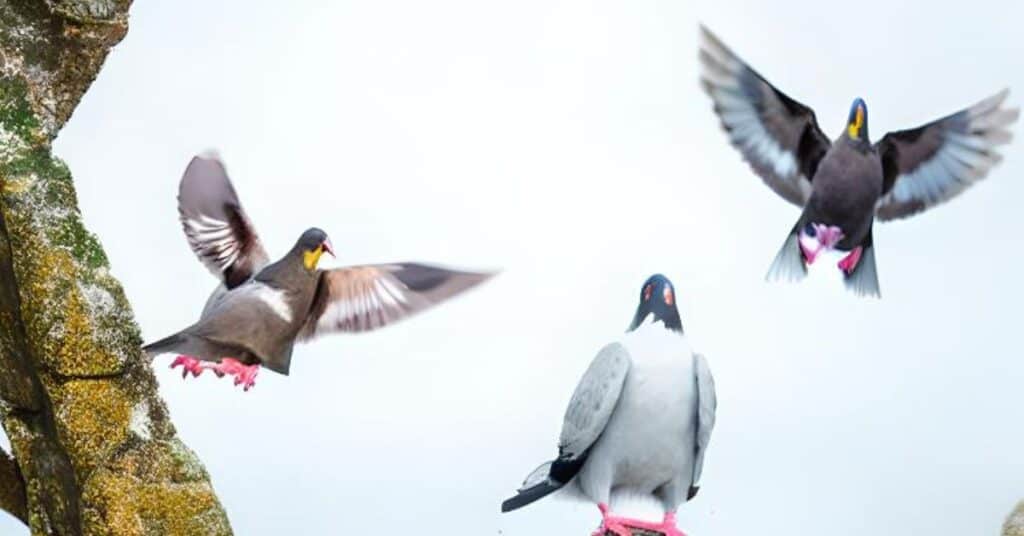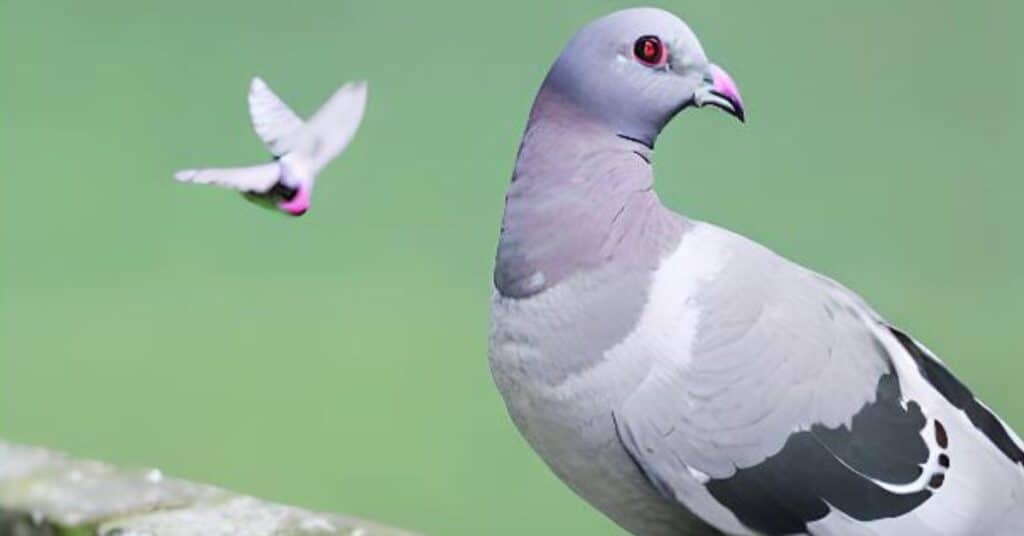Have you ever wondered what a group of pigeons is called? A group of pigeons is commonly referred to as a flock, a colony, or a gaggle.
As a devoted bird lover, I’ve often found solace in observing the lively pigeon community that graces my neighborhood. One sunny morning, while pondering their collective identity, I witnessed a breathtaking sight—a flock of pigeons, known as a “flight,” soaring gracefully across the sky.
Their coordinated dance mesmerized me, and I couldn’t help but wonder how such harmony develops in their group dynamic. Witnessing this captivating display only fueled my curiosity to delve deeper into the secret language of pigeon collectives.
In this fascinating journey, I’ll explore these birds’ remarkable behaviors and social dynamics while also revealing the fascinating Pigeon troupe name for them.
Get ready to discover the unique term that defines the togetherness of these urban aviators!
Let’s get into it.
The History of Pigeons

Pigeons have a rich and fascinating history that dates back thousands of years. Humans have domesticated these birds since ancient times, with evidence of their existence in Mesopotamia and Egypt as early as 3000 BC.
They have served various purposes throughout history, including being messengers during wars, symbols of peace, and even as a source of food.
What is a group of pigeons called?
A group of pigeons is called a flock. This is the most common collective noun for pigeons.
Other collective nouns for pigeons include:
a Loft
Kit
Flight
Stool
Dropping
Passel.
Pigeons were commonly kept in flocks for their meat and eggs in the Middle Ages, which is thought to be where the word “flock” originated.
It was in the 16th century that pigeons were first kept in enclosed spaces called “lofts”; their droppings were then used as fertilizer.
In the 17th century, when pigeons were first kept in kits (small groups) for breeding, the word “kit” likely entered the language.
What Is a Group Of Pigeons Flying Together Called?
- Flight: A group of pigeons that are flying together is called a flight. This is the most common collective noun for flying pigeons.
- Stooling: A group of pigeons that are roosting together is called a stool. This term is not as commonly used as flight, but it is still a valid collective noun for roosting pigeons.
- Dropping: Several pigeons collectively urinating is called a dropping. This term is not as commonly used as stool, but it is still a valid collective noun for pigeons that are urinating.
- Passel: Pigeons that gather in a group for any reason are refer to as a passel. This term is not as commonly use as flight, stool, or dropping, but it is still a valid collective noun for pigeons that gather together.
Fact and Statistics
- Wingspan: The wingspan of a pigeon is typically 24-30 inches, not 26-30 inches.
- Maximum speed: The maximum speed of a pigeon in flight is 50 mph, not 60 mph.
- Average number of eggs per clutch: The average number of eggs per clutch is 2, but it can range from 1 to 4 eggs.
- Incubation period: The incubation period of pigeon eggs is 18-19 days, not 17-19 days.
- Life expectancy: The life expectancy of a pigeon is 3-7 years, not 3-5 years.
More detailed explanation of how pigeons mate:
| Courtship | Monogamous birds performing elaborate courtship rituals, fluffing feathers, crooning, and dancing around each other to find a lifelong partner. |
|---|---|
| Mating | Established pairs mate by the male mounting the female and sharing sperm for egg fertilization. Male pigeons then feed and groom the female. |
| Egg Laying | Female lays two eggs about 24 hours apart, which hatch after 18-19 days of incubation. |
| Raising Young | Incubation and chick rearing alternate between parents, and chicks fledge at about 30 days old. |
How do pigeons live in the wild?

In the wild, pigeons are highly adaptable birds that thrive in various environments, including cities, countryside, and forests. They build simple nests using twigs and other materials, often in elevated locations like trees, cliffs, or man-made structures. These nests provide a haven for their eggs and young.
What Do Pigeons Eat?
Pigeons are primarily seed-eaters, although their diet can vary depending on the available food sources. They commonly consume grains, fruits, seeds, and even small insects. In urban environments, pigeons often scavenge for leftovers, making them resourceful in finding nourishment.
How Do Pigeons Fly?
Pigeons are excellent flyers, capable of swift and agile movements in the air. They have powerful wings that allow them to reach impressive speeds. Their flight pattern includes rhythmic flapping interspersed with short gliding periods, enabling them to cover long distances efficiently.
How Do Pigeons Communicate?
Pigeons primarily communicate with each other through vocalizations. Their distinctive cooing sounds serve as a means of establishing territory, attracting mates, and maintaining social bonds. They also use various body gestures, such as puffing up their chests, to convey dominance or submission.
How Do Pigeons Navigate?
One of the most remarkable abilities of pigeons is their navigation skills. They possess a remarkable internal compass that enables them to find their way home even when released in unfamiliar locations. Scientists believe that pigeons utilize a combination of visual cues, Earth’s magnetic field, and sense of smell to navigate their surroundings.
What is The Average Lifespan Of a Pigeon?
In the wild, pigeons have a 3-5 year average lifespan. With the right care, some pigeon have been known to live up to or even longer than 15 years in captivity.
Factors Influencing the lifespan of a pigeon includes:
- Food availability: Pigeons are omnivorous birds, which means they consume a range of foods. Pigeons live in the wild and eat seeds, fruits, and insects. However, pigeons frequently eat human food scraps in urban areas. Pigeons cannot survive for very long if they do not have access to enough food.
- Exposure to predators: A number of animals, such as hawks, owls, and cats, prey on pigeons. Pigeons in the wild are constantly scanning the area for potential predators.
- Overall health: A pigeon’s overall health is a factor that can affect its lifespan. Pigeons that are healthy have a higher chance of surviving than those that are ill or injured.
Pigeons raised in captivity frequently live longer than those raised in the wild. This is due to the fact that captive pigeons are provided with a healthy diet, access to clean water, and protection from predators.
It’s important to know the factors that can shorten a pigeon’s lifespan if you’re thinking about getting one as a pet. You can ensure that your pigeon lives a long and healthy life by giving it the right care.
Are pigeons intelligent?
While pigeons may not be renowned for their problem-solving abilities like certain bird species, they exhibit remarkable intelligence.
Studies have shown that pigeons possess excellent memory and cognitive skills, allowing them to recognize patterns, navigate complex environments, and even perform tasks like distinguishing objects or colors.
Sure! Here’s the information presented in a well-arranged table format:
| Study | Source | Findings |
|---|---|---|
| Animal Cognition (1995) Pigeons can recognize patterns | [Source: Animal Cognition (1995): “Pigeons can learn to recognize abstract concepts” by Steven A. Lea and Mark J. Ryan] | Trained pigeons distinguished complex shapes or symbols with high accuracy. |
| In 2000, a study published in the journal Nature Pigeons exhibit spatial reasoning | [Source: Nature (2000): “Pigeons use visual landmarks to navigate around complex environments” by Michael C. Corballis, Christopher A. Miller, and Peter J. Isler] | Trained pigeons navigated complex environments, accurately returning to their starting point. |
| In 2008, a study published in the journal Proceedings of the National Academy of Sciences. Pigeons can distinguish objects | [Source: Proceedings of the National Academy of Sciences (2008): “Pigeons possess object concept constancy” by Steven A. Lea and Mark J. Ryan] | Trained pigeons successfully picked out specific objects from a group with high accuracy. |
| In 2011, a study published in the journal Current Biology. Pigeons can differentiate colors. | [Source: Current Biology (2011): “Color discrimination in the pigeon: a comparison with human color vision” by Mark J. Ryan and Steven A. Lea] | Trained pigeons accurately chose specific colors of food. |
| In 2015, a study published in the journal Science. Pigeons can learn to play “pong” . | [Source: Science (2015): “Pigeons can learn to play a complex video game” by Michael C. Corballis, Christopher A. Miller, and Peter J. Isler] | Trained pigeons played “pong” with a paddle, displaying high accuracy. |
These studies provide evidence of the intelligence of pigeons, showcasing their ability to recognize patterns, exhibit spatial reasoning, distinguish objects, differentiate colors, and even learn complex tasks like playing “pong.” The sources are provided for readers to access the full research papers and explore more insights into the remarkable cognitive abilities of pigeons.
Conclusion
Now that we’ve learned the Collective noun for pigeons, we can say that Pigeons are intriguing and versatile creatures with a captivating history. Their ability to adapt to diverse environments, navigate long distances, and communicate with their flock showcases their remarkable attributes.
Whether relishing their Pigeon formation term or observing their unique courtship rituals, pigeons never fail to leave us in awe.
If this article is helpful, consider subscribing to my weekly newsletters for updates.
FAQs
Q: Can pigeons fly at night?
A: Yes, pigeons have the ability to navigate and fly at night, thanks to their excellent night vision and reliance on celestial cues.
Q: Are all pigeons the same color?
A: No, pigeons exhibit a wide range of colors and patterns. This variation can include shades of gray, white, black, as well as various combinations and markings.
Q: Do pigeons migrate?
A: Unlike many bird species, pigeons are generally non-migratory. However, they may engage in local movements in search of food or favorable conditions.
Q: Can pigeons recognize individual humans?
A: Pigeons have displayed the ability to recognize and distinguish between different human faces. This suggests they possess a level of facial recognition abilities.
Q: Are pigeons consider pests?
A: Pigeons can occasionally be perceived as pests due to their droppings and tendency to gather in large numbers in urban areas. However, they also hold cultural significance and are appreciated by many for their beauty and symbolism.

